Introduction
Due diligence is a critical process that financial professionals must undertake to fully understand the intricacies and potential risks of any business transaction. It involves a comprehensive examination of a company's financial, legal, and operational dimensions to uncover hidden liabilities and evaluate its overall health and prospects. In this article, we explore the different types of due diligence, the importance of due diligence in business transactions, key components of the due diligence process, and the role of consultants and experts in conducting due diligence.
We also delve into the specific industries of healthcare and SaaS to highlight the tailored approaches required for thorough due diligence. Additionally, we discuss the use of technological resources, such as artificial intelligence and machine learning, in enhancing the efficiency and accuracy of due diligence. Finally, we provide best practices for conducting due diligence and present case studies showcasing successful implementation of due diligence services.
Through this comprehensive exploration, financial professionals can gain valuable insights and practical advice to navigate the complexities of due diligence and make informed decisions.
Types of Due Diligence
Understanding the various dimensions of due diligence is pivotal for any financial professional. Financial due diligence meticulously examines a company's financial statements, assets, liabilities, cash flows, and financial projections to ascertain its fiscal health. Legal due diligence delves into the company's adherence to laws and regulations, which is particularly vital for industries subject to rigorous oversight.
Operational due diligence evaluates the efficiency and effectiveness of a company's operations, ensuring that all processes align with the strategic goals.
Firms like SmartRent, which faced scrutiny over their value and business model, underscore the importance of comprehensive due diligence. In their case, questions arose regarding profitability, gross margins, and the sustainability of their growth model. Such insights are critical for stakeholders to make informed decisions.
The recent proposals by President Biden to safeguard retirement savings highlight the growing need to protect investors from financial misadventures. The due diligence process serves as a shield, revealing potential risks and liabilities, from environmental compliance to intellectual property issues and cybersecurity threats.
In the investment banking sector, due diligence is an indispensable tool for both buyers and sellers in M&A transactions. It helps navigate complex capitalization tables, market conditions, and financial intricacies. The role of due diligence continues to evolve with industry trends, requiring a keen eye on every aspect of a target company.
Statistical data reveal a stark reality: a significant portion of new businesses do not access formal capital, leading many to rely on personal savings. This underscores the need for thorough due diligence to mitigate risks. Furthermore, the high failure rate of early-stage investments is often not due to fraud but to a myriad of other factors, emphasizing the importance of a robust due diligence process to discern the viability of potential investments.
In light of these considerations, it is clear that due diligence is not just a mere checklist but a strategic exploration of a company's complete ecosystem, serving to illuminate a path through the complexities of financial decisions.
Importance of Due Diligence in Business Transactions
Due diligence transcends mere business protocol; it's a strategic maneuver critical to the integrity of any merger, acquisition, or partnership. This meticulous process involves a deep dive into the financial, legal, and operational facets of a company in question—scrutinizing each detail to unearth potential risks and hidden liabilities. By equipping an acquirer with this level of insight, due diligence empowers them to craft negotiations to their advantage, extract the utmost value from the deal, and sidestep unseen dangers.
The landscape of such transactions is fraught with nuances, as underscored by cases where the absence of due diligence led to unforeseen complications and financial turmoil, sometimes reminiscent of the intricate challenges faced in managing wildfire risks in the utility sector. In mergers and acquisitions, understanding the full scope of a business's valuation is non-negotiable. It's not just about a number but an informed valuation backed by an analysis of financial statements, assets, customer base, and market trends—all of which shape a solid negotiation platform.
Failing to do so can result in selling a business short or deterring buyers with inflated figures. The importance of due diligence is further highlighted by the complex legal frameworks governing high-stakes financial transactions, including the ever-evolving landscape of mergers and acquisitions contracts. The depth and breadth of these agreements, as revealed by an extensive corpus of merger documents over two decades, attest to the gravity of due diligence in securing a successful business outcome.
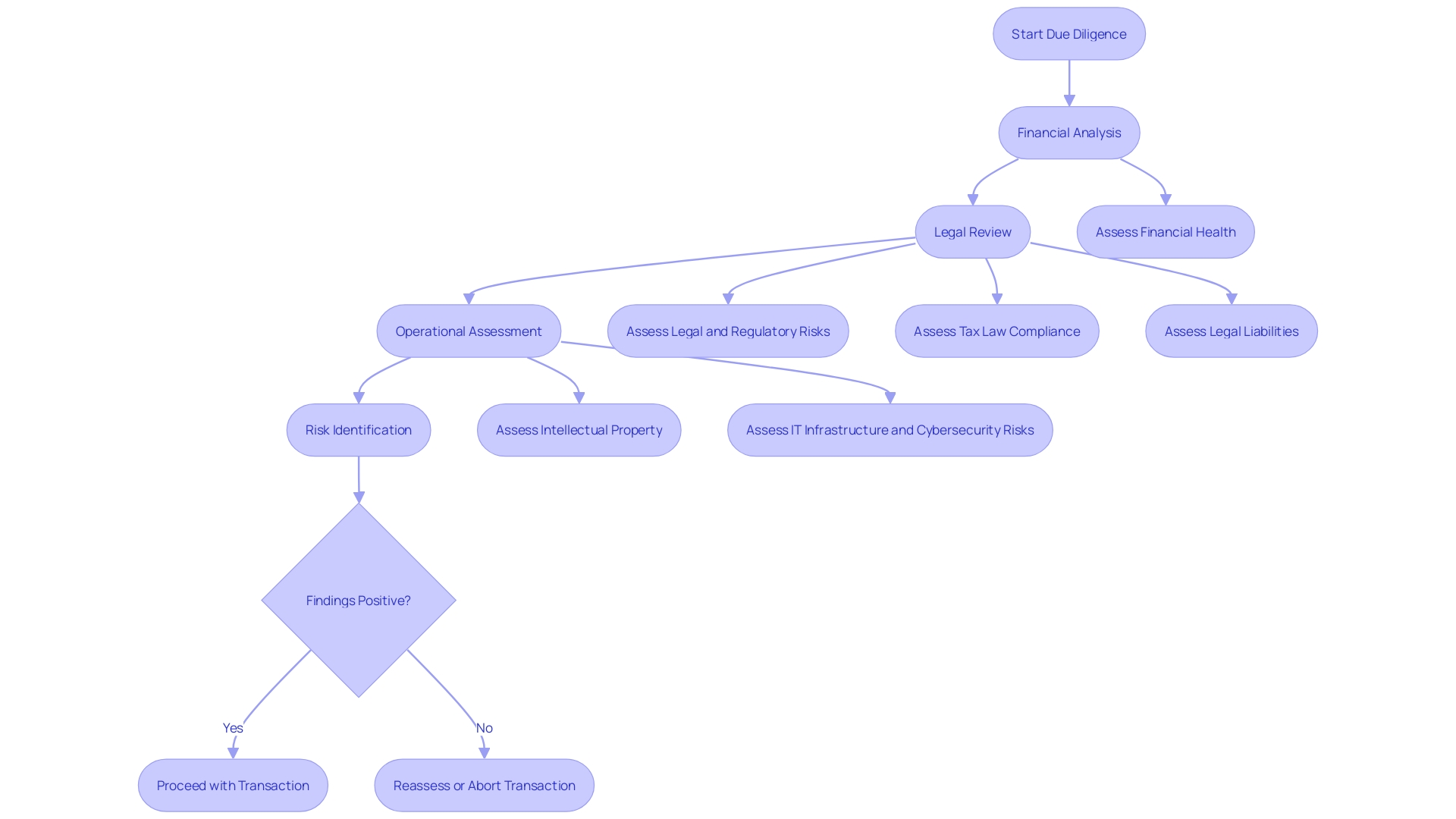
Key Components of Due Diligence
Due diligence transcends traditional financial audits, encompassing a holistic investigation of a company's multi-faceted operations. This comprehensive approach includes a meticulous inspection of financial documents to evaluate the company's assets, liabilities, cash flow, and financial projections. Legal contracts are scrutinized to ensure regulatory compliance, a key concern for industries under tight legislative scrutiny.
Moreover, examining tax adherence through past returns and audits is crucial for a thorough due diligence process.
Operational processes and capabilities undergo a rigorous review to identify potential inefficiencies or risks, while the company's competitive market stance is gauged through in-depth analysis. Intellectual property, including patents and trademarks, is assessed to safeguard a company's innovative edge. Additionally, the due diligence process extends to evaluating IT infrastructure, from code originality to cybersecurity, ensuring the company's technological assets and risks are fully understood.
This multi-dimensional strategy, supported by expert intelligence and analysis, is vital in uncovering hidden risks and providing a clear picture of a company's health and prospects. As such, due diligence services as an indispensable tool for informed decision-making in today's complex business environment.
Operational Due Diligence: Assessing Efficiency and Capabilities
Operational due diligence is a critical component in the acquisition process that goes beyond simple financial analysis. It is an intensive examination of the many facets of a target company, including its adherence to environmental regulations, evaluation of its entire IT infrastructure, and assessment of any legal or regulatory risks—particularly in industries that are heavily regulated. This process meticulously inspects a company's existing operational processes, from organizational design to supply chain logistics and technology systems.
By delving into the operational backbone of a company, due diligence can not only pinpoint areas ripe for improvement and cost efficiency but also highlight potential synergies that could be leveraged post-acquisition. Furthermore, a thorough assessment of the company's financial health, legal liabilities, and compliance with tax laws is essential to uncover any hidden risks. The intricate analysis includes a review of financial statements, assets, debts, cash flow, and future projections, as well as a comprehensive examination of tax returns, audits, and agreements.
The goal is to ensure a complete understanding of the target's operational dynamics, enabling informed decision-making and strategic planning for future growth and sustainability.

Legal Due Diligence: Compliance and Risk Assessment
In the complex landscape of mergers and acquisitions, legal due diligence is a critical element that demands meticulous attention. It's a process where the acquirer evaluates the target company's adherence to laws, regulations, and contractual commitments. This analysis includes an exhaustive examination of legal documents such as contracts, permits, licenses, and any history of litigation, akin to a comprehensive audit of a company's legal health.
A detailed legal due diligence process exposes potential legal hazards, liabilities, or ongoing disputes that could influence the deal's outcome. For instance, reviewing the market trends and forecasts provided by industry experts such as Savills reveals that while the technology sector is racing towards innovation, businesses must adeptly navigate a thicket of digital regulations, cybersecurity concerns, and litigation risks.
The insights shared by legal and tech specialists globally underscore the importance of being well-informed about the dynamic legal challenges that may arise. In an era where economic realities and national security interests are increasingly intertwined with technology advancement, the due diligence process extends beyond traditional checks to encompass a strategic analysis of the target's operations and potential implications of its stakeholder agreements.
As emphasized by legal experts, transparency regarding the target company's key stakeholders and a strategic approach to third parties, such as joint venture partners, is essential. The negotiation of stakeholder rights, employee purchase options, and founders' interests can significantly affect the transaction. Moreover, contemporary legal due diligence must consider the economic realities as articulated by Supreme Court Justice Thurgood Marshall, focusing on the essence of investments over their nominal classification.
In summary, legal due diligence is a multifaceted procedure that not only scrutinizes the current legal posture of a company but also anticipates the broader implications of its market position and stakeholder dynamics. This proactive approach is essential for businesses to ensure a successful restructuring and integration post-acquisition.
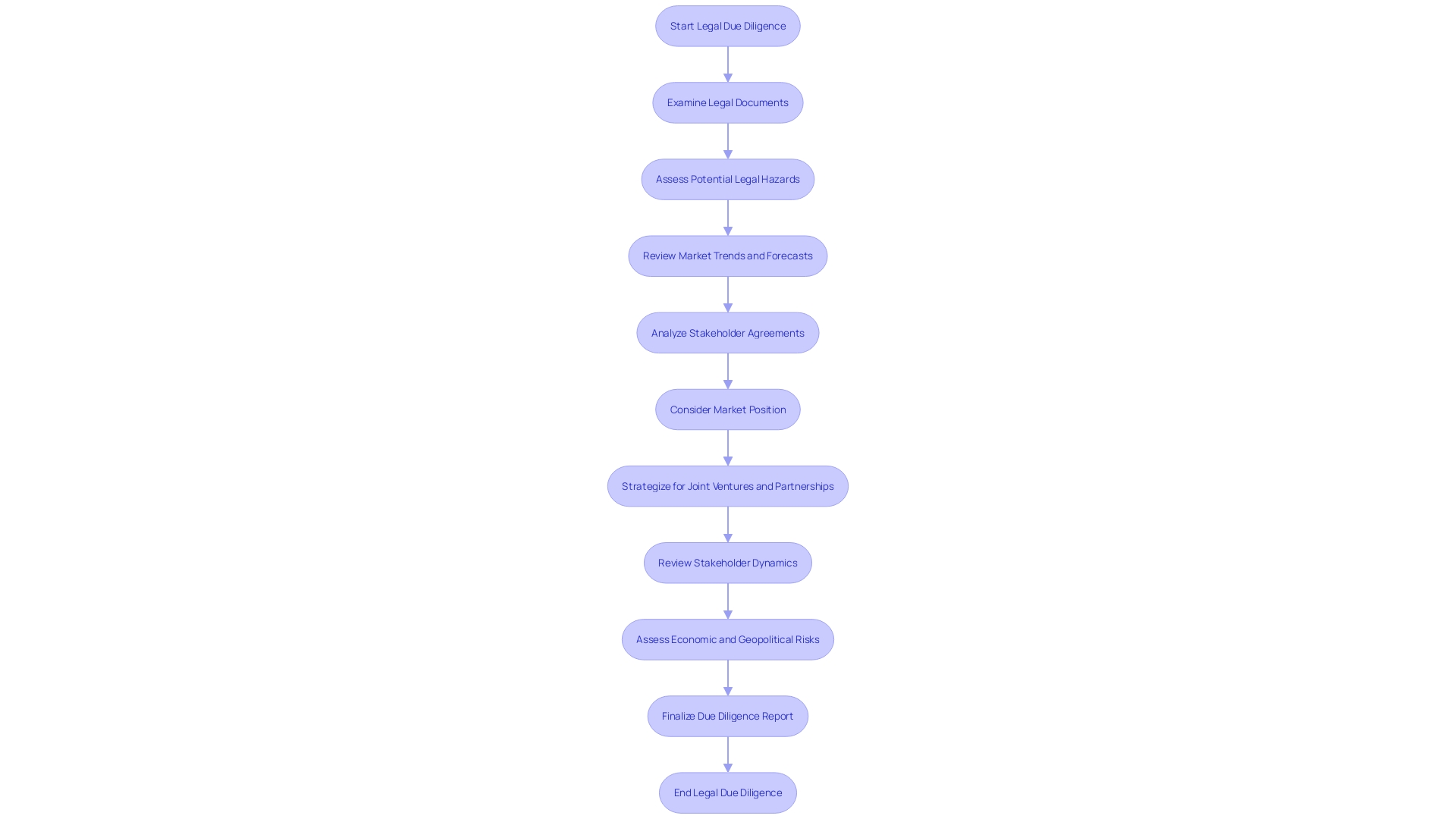
Financial Due Diligence: Analyzing Financial Health
Effective financial due diligence is a comprehensive evaluation of a company's financial health, extending beyond simple audits. It scrutinizes the financial statements, cash flow forecasts, existing debt, tax issues, and potential financial exposures. This thorough financial inspection is vital to understand the profitability, liquidity, and overall fiscal strength of a company.
It requires an assessment of various factors, such as whether the company has developed and managed industry-specific software, hardware, or devices, and if it has navigated products through clinical or market stages. Additionally, it involves understanding the company's ability to sustain and grow dividend payouts by analyzing financial performance against historical data and industry standards.
In the context of a market saturated with unicorns—start-ups valued at over $1 billion—financial due diligence becomes even more crucial. Recent Brain research points out that while nearly 2,500 companies have achieved unicorn status in the last two decades, only a select few are cash-flow positive without continuous venture capital funding. This underscores the importance of due diligence in discerning genuine fiscal sustainability from inflated market valuations.
Moreover, due diligence should encompass legal and regulatory compliance, particularly for industries under stringent oversight. This includes evaluating adherence to environmental laws, analyzing the company's entire IT framework, and confirming tax law compliance through the examination of tax returns, audits, and agreements. An in-depth look at the company's legal obligations, such as partnership and licensing agreements, is also imperative to uncover any hidden liabilities that could impact financial stability.
Forensic accounting techniques, as detailed in 'Asian Financial Statement Analysis,' can reveal discrepancies and provide insights akin to solving a financial crime. This approach, based on the time-honored double-entry accounting system, helps in identifying shifts in assets and liabilities that may indicate underlying issues. As the financial statements—the balance sheet, income statement, and cash flow statement—are closely interrelated, changes in one can have significant implications for the others.
Ultimately, the goal of financial due diligence is to provide a clear picture of a company's financial trajectory, ensuring that investors and stakeholders can make informed decisions aligned with their risk tolerance and investment objectives. It's not merely about determining a company's current financial status but also about predicting its capacity for future profitability and growth.
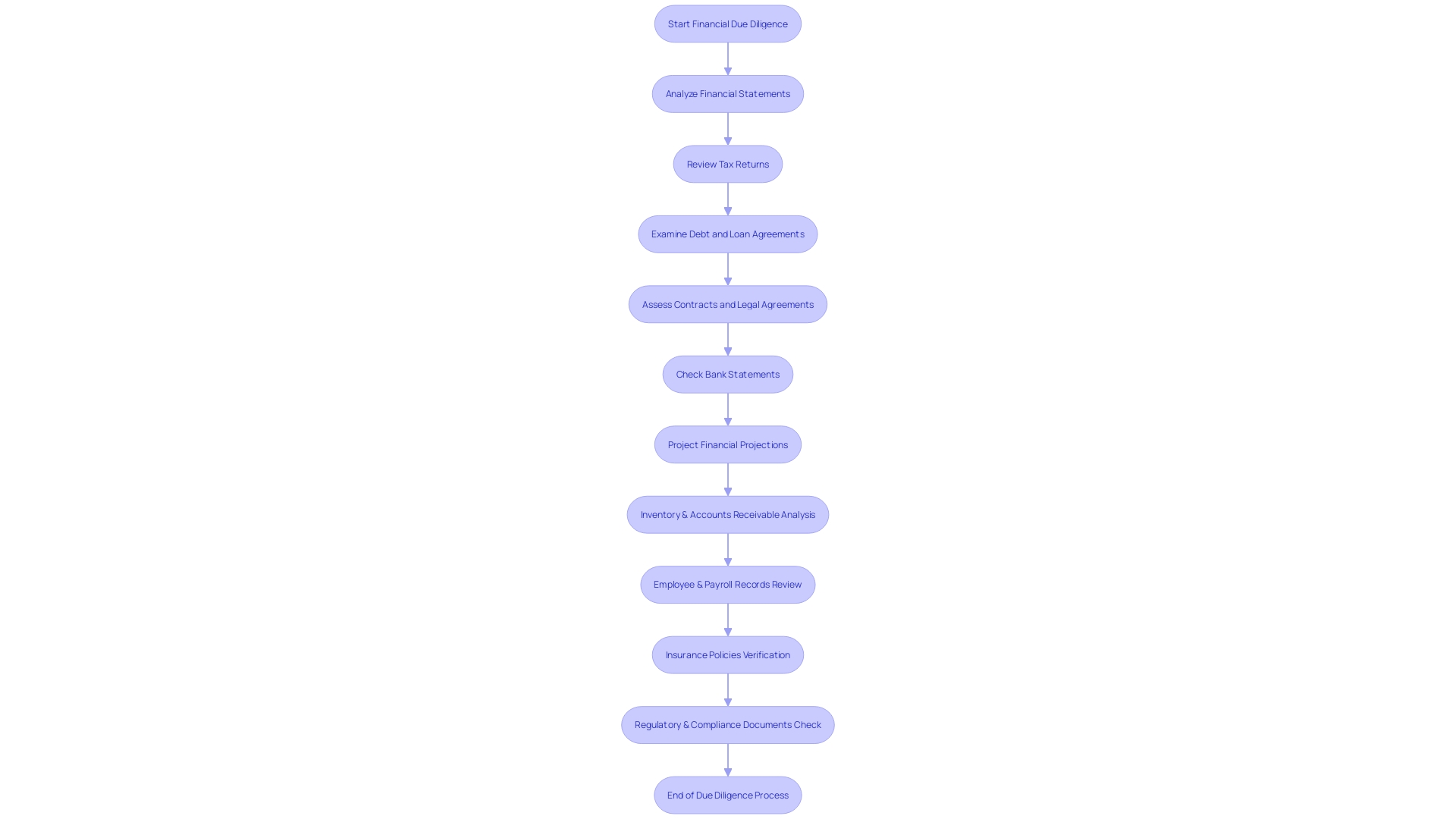
Role of Consultants and Experts in Due Diligence
When navigating the complexities of a business transaction, it's crucial to involve consultants and industry experts who offer more than just their expertise; they deliver a panoramic view of the company in question, akin to peering from a bird's-eye perspective. Such professionals meticulously examine the structural integrity of a project, discerning whether the technology at its core is bespoke or a modified iteration of an existing framework. Their analysis often extends to risk assessment, particularly in sectors where the implications of oversight can be profound, such as utilities where wildfires or other catastrophic events could have severe repercussions.
Moreover, these specialists are instrumental in dissecting the various components of a business, ensuring compliance with environmental norms, legal statutes, and tax obligations, while also scrutinizing financial health and potential legal liabilities. Their objective scrutiny is essential in identifying and addressing any concealed risks.
In this vein, Gofaizen & Sherle, a consultancy firm with a broad service spectrum from business strategy development to financial licensing, emphasizes the importance of due diligence. Their announcement serves as a reminder that due diligence is an imperative measure, not just for regulatory compliance but as a safeguard against potential losses.
To gain a comprehensive understanding of a consultant's prowess, it's advisable to delve into their project history, examining the complexity and scale of their endeavors and the technologies employed. This evaluation should encompass a review of their team's qualifications and a request for references from prior collaborations, particularly in specialized fields like healthcare, where expertise can have significant ramifications.
By enlisting the aid of these seasoned experts, businesses can navigate the intricacies of due diligence with assurance, equipped with the insights needed to make informed decisions and steer clear of unforeseen pitfalls.
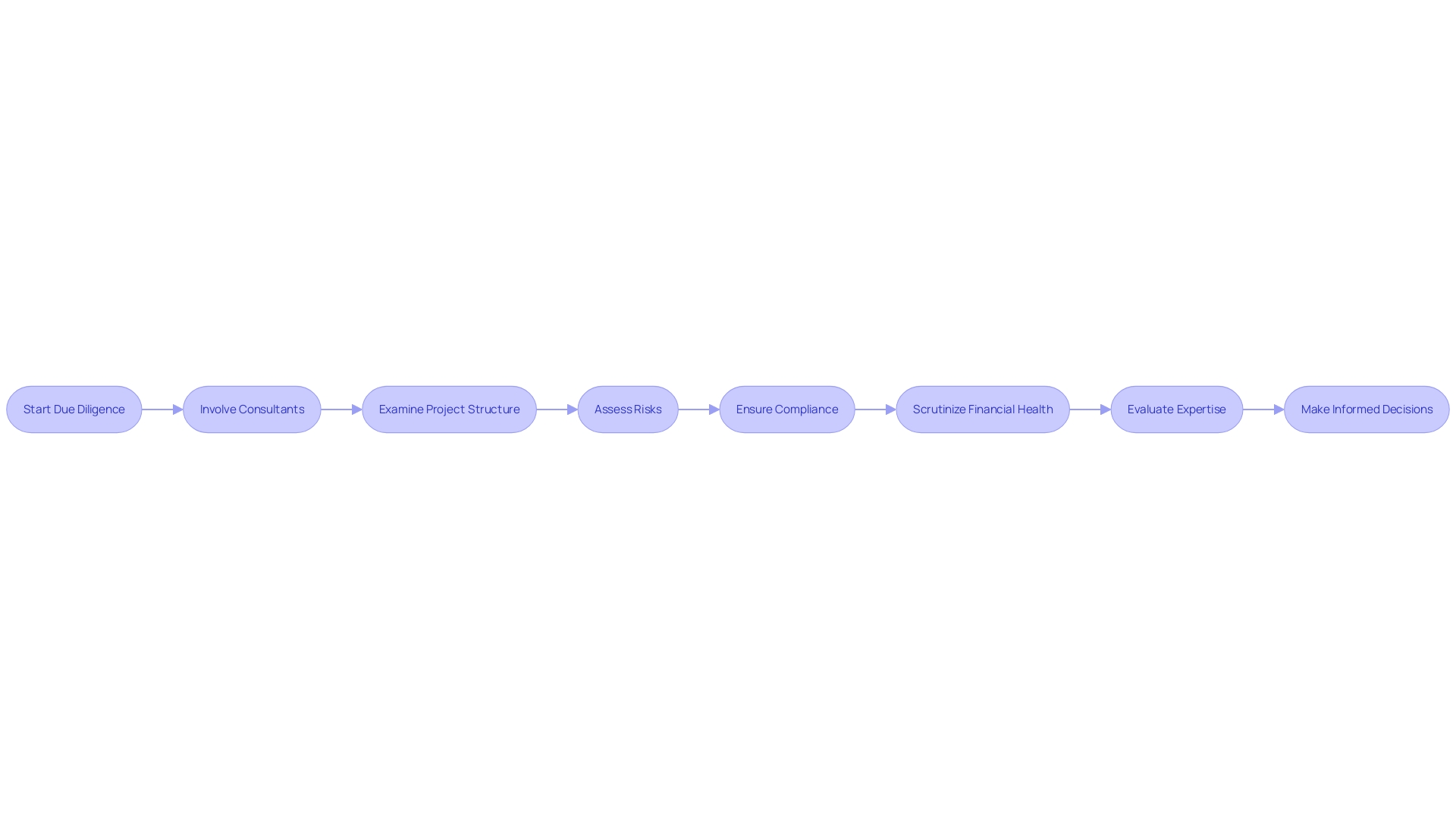
Due Diligence in Specific Industries: Healthcare and SaaS Examples
Comprehensive due diligence is crucial for navigating the intricacies of different industries, with tailored approaches addressing the unique challenges each sector faces. In healthcare, the emphasis is on ensuring regulatory compliance, safeguarding patient data, and maintaining robust healthcare provider relationships. For instance, transitioning to new clearinghouses demands meticulous payer mapping to avoid costly claim submission errors.
Similarly, academic medical centers like UHealth must navigate the complexities of integrating academic and healthcare operations, necessitating solutions that differentiate and streamline their processes.
Meanwhile, in the tech-driven SaaS realm, evaluating intellectual property, software scalability, and customer retention is paramount. These sectors are not only governed by stringent regulations but also by the need to manage sensitive data and adapt to digital advancements. The healthcare IT sector, though fragmented, is increasingly moving to the cloud, highlighting the importance of due diligence in identifying risks and opportunities in a landscape where innovation and consumer interaction are evolving rapidly.
The stakes are high, as underscored by cases like Akumin's financial restructuring following a ransomware attack that significantly disrupted patient services. It's evident that thorough due diligence, which encompasses financial stability, legal liabilities, and IT infrastructure, is more than a mere financial audit; it is a safeguard against the underlying economic realities that can impact a company's future.
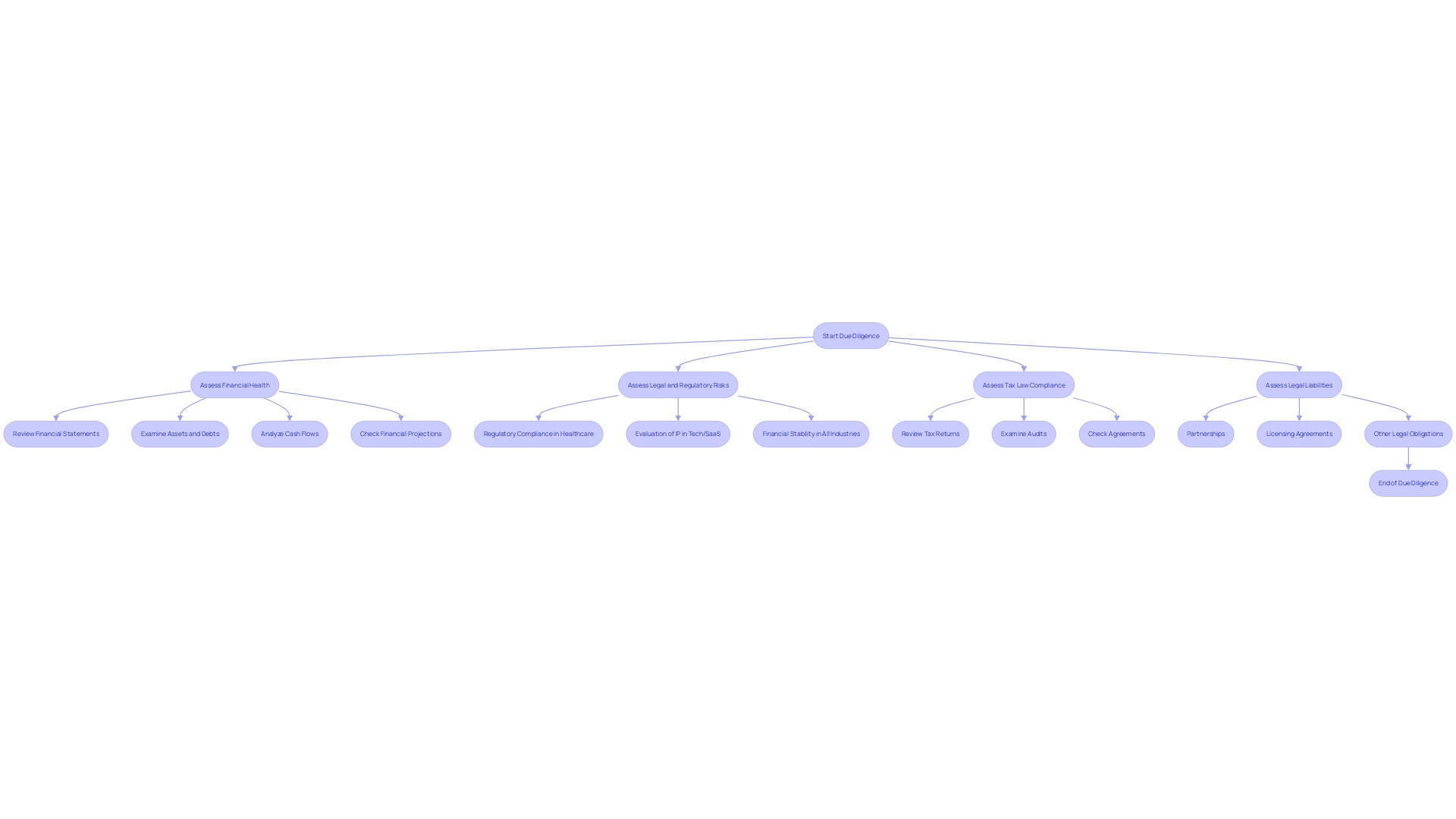
Customization and Adaptability in Due Diligence Services
Effective due diligence is a multifaceted process that, when conducted thoroughly, can expose potential risks and ensure informed decision-making during business transactions. Beyond mere financial audits, a comprehensive due diligence examines a company's adherence to environmental regulations, scrutinizes its IT infrastructure, and assesses its financial health through a careful review of financial statements, assets, debts, cash flows, and projections. It also delves into the legal and regulatory risks, which are particularly pivotal in heavily-regulated industries.
A meticulous examination of a company's tax compliance is equally essential, including an analysis of tax returns, past audits, and existing agreements. The review extends to legal liabilities, encompassing partnerships and licensing agreements, as well as the assessment of intellectual property assets such as patents, copyrights, trademarks, and brand value. The cybersecurity risks associated with a company's IT systems are another critical area of focus.
In practice, the necessity of tailoring due diligence services to each client's specific needs is exemplified by a case study from the wildfire-prone regions of California. Here, investor-owned electrical companies face the complex challenge of balancing safety measures with economic considerations, such as higher electricity rates for the public. Furthermore, reputational risks are significant, given the intense scrutiny from media and political spheres.
This scenario underscores the importance of a dynamic and responsive approach to due diligence, where strategies are carefully crafted to address the unique circumstances and risk profiles of each company.
The legal technology (LegalTech) industry offers insights into the evolving landscape of due diligence services. The industry's leading companies have identified key driving factors and are catering to various market segments, with certain regions and segments poised for rapid growth. In this competitive environment, the role of essential players in the value chain has become increasingly critical.
In conclusion, the art of due diligence lies in its ability to adapt to the unique challenges and opportunities presented by each client. By providing a tailored approach that encompasses a wide range of assessments, due diligence services enable companies to navigate complex business landscapes with confidence and precision.
Technological Resources in Due Diligence
The intersection of technology and due diligence has transformed the landscape of financial investigations, with cutting-edge advancements like artificial intelligence (AI) and machine learning playing pivotal roles. A notable case in point is the use of AI to dissect complex data sets in search of anomalies or irregularities. By analyzing patterns across vast arrays of information, AI algorithms can reveal insights not easily detectable by traditional methods, thereby enhancing the thoroughness and accuracy of due diligence processes.
For instance, recent breakthroughs in AI have led to the development of software capable of detecting financial crimes such as money laundering with unprecedented speed and efficiency. Research highlighted in the Proceedings of the 2023 SIAM International Conference on Data Mining demonstrates a new software that is three times more effective than existing detection techniques. It has the prowess to scrutinize larger data volumes and can track intricate transaction networks, even when funds are dispersed across multiple accounts.
This technological prowess is not limited to financial crime detection. In investment due diligence, AI plays an instrumental role by assessing a company’s myriad facets, from financial health—including scrutiny of statements, assets, debts, and cash flows—to legal and regulatory compliance, tax obligations, and cybersecurity risks. The ability to swiftly evaluate a company's IT infrastructure and intellectual property assets is particularly crucial in our digital era.
In the context of regulatory adherence, AI can be a formidable ally. As regulators adapt to the evolving technological landscape, AI and machine learning tools empower them to monitor compliance more efficiently, ensuring that companies adhere to stringent industry standards without compromising operational efficacy.
Ultimately, embracing AI and machine learning is no longer an optional luxury but a strategic imperative for firms intent on staying ahead of the curve. As the capabilities of these technologies advance, they will undoubtedly continue to reshape the domain of due diligence, offering a formidable edge to those who wield them effectively.
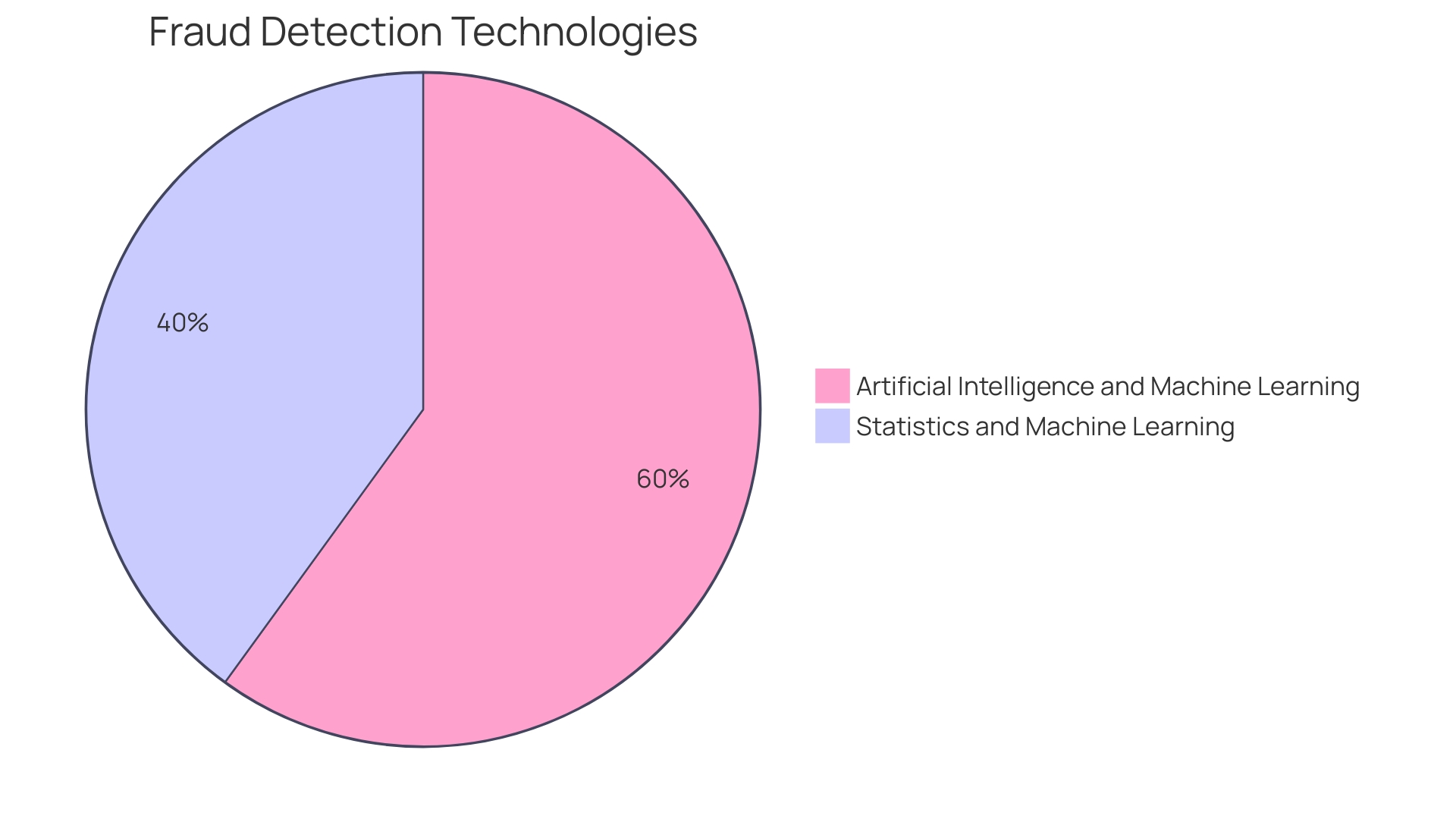
Best Practices for Conducting Due Diligence
Commencing the due diligence process at an early stage is crucial, as it provides ample time to thoroughly examine the multifaceted aspects of a company. A detailed inquiry into a company's operations goes beyond financial scrutiny; it encompasses environmental regulation adherence, IT infrastructure evaluation, and identification of potential risks. Assembling a proficient team is pivotal for a meticulous assessment of a company's financials, including statements, assets, liabilities, cash flow, and future projections.
Moreover, it's essential to assess legal and regulatory risks, which are particularly critical in industries subject to stringent regulations. Evaluating a company's tax law compliance through examination of tax returns, audits, and related agreements is also a vital component of due diligence. Legal liabilities, such as partnerships and licensing agreements, warrant careful inspection to ensure all obligations are understood and manageable.
In addition to legal and financial aspects, intellectual property assets like patents, copyrights, trademarks, and brands require protection and valuation. An assessment of a company's IT infrastructure and cybersecurity measures is indispensable given the increasing prevalence of digital threats. Transparent communication and diligent documentation throughout this process not only ensure clarity and accountability but also pave the way for informed decision-making and strategic planning.
Case Study: Successful Implementation of Due Diligence Services
A pivotal example of a successful corporate restructuring is showcased by IBL, a conglomerate operating in over 23 countries with a diverse portfolio in logistics, seafood, hospitality, and other sectors. Despite a rich entrepreneurial history and innovation being embedded in its culture, IBL recognized the necessity of a balanced innovation portfolio, especially in the wake of the COVID pandemic and other disruptive events. By conducting a thorough due diligence, IBL addressed its portfolio imbalance that previously over-emphasized sustaining and efficiency innovations.
This strategic shift was vital for its restructuring, allowing IBL to navigate the economic turbulence and maintain its pioneering spirit.
Similarly, TBC Bank, with its customer-centric mission to simplify lives, embarked on a digital transformation journey. The bank's commitment to agile principles and reduced organizational complexity was instrumental in its international expansion and digital shift. Even so, the bank grappled with inter-team dependencies and technical debt, challenges that were dissected and understood through comprehensive due diligence.
In the regulated financial market space, Boerse Stuttgart Group's foray into the volatile world of cryptocurrency required a heightened emphasis on AML and compliance. The group's collaboration with Chainalysis provided it with the necessary AML capabilities and a broader data perspective, essential for informed decision-making. This due diligence was crucial not only for compliance but also for fostering a regulated platform appealing to risk-averse financial institutions.
These cases underline the critical nature of robust due diligence, going beyond financial audits to encompass legal, regulatory, tax, and IT assessments. As evidenced by the highest number of company insolvencies since 1993, at 25,158 in 2023, meticulous due diligence is indispensable for companies aiming for a successful restructuring in today's complex business environment.
Conclusion
Due diligence is a critical process for financial professionals to understand the intricacies and risks of business transactions. It involves examining a company's financial, legal, and operational dimensions to uncover hidden liabilities and evaluate its overall health.
Financial due diligence analyzes a company's financial statements, assets, liabilities, cash flows, and projections. Legal due diligence evaluates regulatory compliance and contractual commitments. Operational due diligence assesses efficiency, effectiveness, and potential risks.
These components provide valuable insights for informed decision-making.
Thorough due diligence is vital in business transactions, empowering acquirers to negotiate deals and avoid unforeseen dangers. It ensures the integrity of mergers, acquisitions, and partnerships. Understanding a company's valuation, financial health, legal obligations, and market position is crucial.
Consultants and industry experts play a crucial role in conducting due diligence. They offer a panoramic view, examining a company's structure, risk assessment, financial health, and legal liabilities. Their expertise helps navigate complexities and make informed decisions.
Different industries require tailored due diligence approaches. Healthcare focuses on regulatory compliance and patient data protection, while SaaS evaluates intellectual property and scalability. Thorough due diligence uncovers risks and ensures future success in these sectors.
Technology, specifically artificial intelligence (AI) and machine learning, transforms due diligence. AI algorithms analyze complex data sets, revealing insights not easily detectable by traditional methods. Embracing AI and machine learning is essential for staying ahead.
Best practices for due diligence include early commencement, assembling a proficient team, thorough examination of operations, assessing legal and regulatory risks, evaluating tax compliance, protecting intellectual property, scrutinizing IT infrastructure, and maintaining transparent communication.
Real-world case studies demonstrate successful due diligence implementation. Companies like IBL, TBC Bank, and Boerse Stuttgart Group leverage thorough due diligence to navigate economic turbulence, drive digital transformations, and ensure compliance.
In conclusion, due diligence provides valuable insights and practical advice for financial professionals in business transactions. Comprehensive due diligence leads to informed decisions and the success of ventures.




